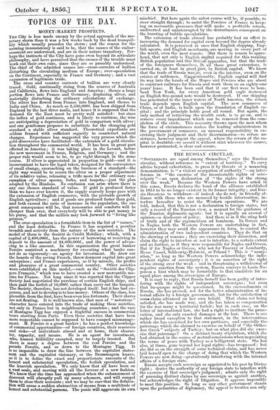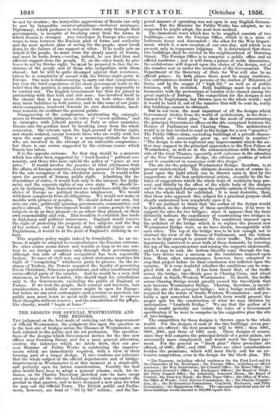THE RUSSIAN CIRCULAR.
" SOVEREIGNS are equal among themselves," says the Russian circular, without reference to extent of territory." To carry
advice beyond exhortation, to press it by threats or a menacing demonstration, is "a violent usurpation of authority "—an inter- ferenoe in "the exercise of the incontestable rights of sove- reignty "—an open declaration Of "the rights of the strong
over -the weak." Because the Western Powers have acted in this sense, Russia declares the bond of the alliance established
i 1815 to be no longer existent in its former integrity ; and Rus- sia threatens to withdraw—if indeed she do not, in friendly al- liance with those who are menaced by hostile intervention, in- terfere hereafter to resist the Western operations. We are told, indeed, that this is not a declaration to foreign states, but only a record of the Russian view, a manual for the guidance of the Russian diplomatic agents : but it is equally an avowal of opinion—a disclosure of policy. And there is in it the sting both of truth and of the argumentum ad hominem. In Greece and in Naples both the Western Powers are undertaking in fact, however they may avoid the appearance in form, to control the administration of two independent countries. They do that on the showing of reasons ; they are exercising their discretion, and claim the right to interfere or not to interfere, to a certain extent and no further, as if they were responsible for Naples and Greece. But if for Naples or Greece, why not for Tuscany or Lombardy,
Hesse Cassel, Schleswig-Holstein. or Poland ? This is "usurp- ation," so long as the Western Powers acknowledge the inde- pendent rights of sovereignty ; it is an assertion of the right of the strong over the weak : and in threatening a withdrawal of negative sanction from the system, Russia conveys to Louis Na- poleon a hint which may be formidable to that candidate for an equal place among the sovereigns of Europe.
It is easy to reply, that Russia herself has been guilty of inter- fering with the rights of independent sovereigns ; but even that tu-quoque might be questioned. In the encroachments of Russia, she has pressed, not for the better administration of in- ternal affairs by a foreign government, but for the satisfaction of some claim advanced on her own behalf. That claim not being satisfied, she has made war, and she has taken as compensation for the war many a territorial forfeit; but in each case, on the letter of international law, she had a right to institute the prose- cution, and she only exacted damages at the last. There is one rather broad exception to that statement, in the interventions which she has exercised for her own partisans, and especially the. patronage which she claimed to exercise on behalf of "the Ortho- dox Greek" subjects of Turkey : but on what plea did she exer-
cise that patronage ? On a distinct treaty stipulation, which she had obtained in the course of mutual concessions when negotiating the terms of peace with Turkey as a belligerent state. She has also, at times' gone beyond her legal rights—has trespassed ; but she did so on the strength of some technical claim, and has never ' laid herself open to the charge of doing that which the Western Powers are now doing—gratuitously interfering with the internal affairs of a foreign state.
Russia accepts each sovereign as appointed to his post by Divine right ; denies the authority of any foreign state to interfere with the exercise of that sovereign's judgment ; admits only the right of pursuing distinct claims by one sovereign as against another, but acknowledges the right of litigation. It appears impossible to meet this' sition. So long as any other government stands upon the pe tries of diplomacy, the appeal to treaties can only be met by treaties ; the lawyerlike aggressions of Russia can only be met by lasvyerlike counter-pleadings--technical resistance. Diplomacy, which professes to recognize states only through their governments, is ineapble of breaking away from the forms in which Russia is stronger. Any interloper in Europe who endea- vours to trim between the Russian plan of forms and authority and the more modern plan of acting for the people, must break down by the failure of one support or other. If he really acts on behalf of the people, he must cross the steady march of Russia, and must be borne down,—un/ess, indeed, he can find firm and efficient support from the people. If, on the other hand, he pro- fesses to act by Divine right, ho must be prepared to face the re- sistance of the people and of those who sympathize with them abroad ; but he will be quite disarmed against that resistance, unless he is completely of accord with the Divine-right party in Europe. One man is endeavouring to carry out that compromise ; but even the brief experience of his short government leads to the belief that the position is untenable, and the policy impossible to be carried out. The English Government has thus far joined in partnership with that bold and able man ; has involved itself in the chance that it may incur discredit on both sides—that it may incur liabilities to both parties, and be like some of our joint- stock-companies, insolvent towards its own shareholders, insol- vent towards its creditors the general public. Disapproving of the compromise, mistrusting the entangle- ments in Democratic intrigues in votes of "seven millions," and
in strategies with Liberal intrigues, of Italy or other countries, Russia cuts the gordian knot by breaking away from the whole connexion. She retreats upon the high ground of Divine right, and stands isolated, except towards those who are really with her upon the same ground. This is a menacing attitude for those who are involved in the attempt at an untenable compromise : but there is one course suggested by the extreme course which Russia has taken.
It is the opposite extreme. Its first step would be a measure which has often been suggested by " hard:headed " political eco- nomists, and those who have upheld the policy of "peace at any price." It would involve the practice of total abstinence from the affairs of foreign countries, leaving the ground of Divine right for the sole occupancy of the Absolutist powers. It would retire upon the ground of human public right. Admitting the in- dependence of states, it would look only to the interest, the judg- ment, and the separate rights of our own state. We should be- gin by declaring, that henceforward we would have with the other states of Europe no political treaties whatsoever. We would withdraw completely from all obligations. We would not make or meddle with princes or peoples. We should defend our own, but only our own ; politically ignoring governments, communities, and parties abroad. Our Government would of course permit its elm subjects to do as they pleased—to go where they pleased, on their own responsibility and risk. This would be to establish free trade in diplomacy and political intercourse. England would reserve the right of protecting the property of her subjects and the flag of her nation ; and if any foreign state inflicted injury on an Englishman, it would be at the peril of England's stalking in re- turn.
This negative policy might indeed be formidable. As an ex- treme it might be adapted to counterbalance the Russian extreme. No other course seems direct and tenable so long as we are con- tent to see foreign countries only through their governments ; although this rule of official recognition has been repeatedly broken. In cases of civil war, any adroit statesman exercises his right of " recognizing " whichever party he pleases. In the in- stance of Turkey, the Powers acquired the faculty of perceiving Greek Christians Sclavonic populations, and other constituent but extra-official pails of the country. And he would be a very dull statesman, in Paris or London, who should limit his calculations only to the Government, excluding the public of England or France. If we took the people, their counsel and interests, into consideration, a totally new course might be open for Europe : but before we can even contemplate such a course as practical, our public men must learn to speak with sincerity, and to express their thoughts without reserve ; and the consultation of the p&ple, like charity, would "begin at home."



































 Previous page
Previous page